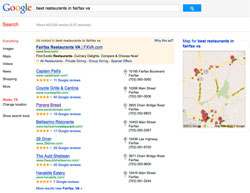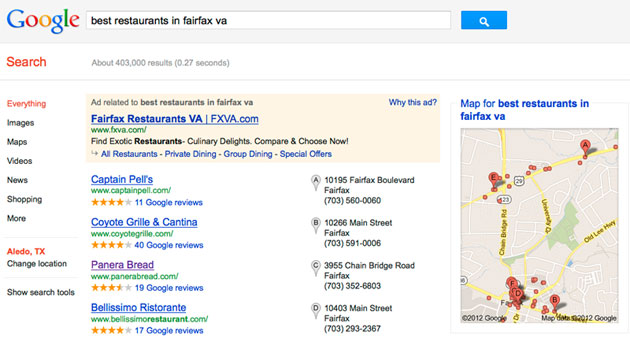
Katalyst Solutions - Web Design & Web Development serving Sterling, VA & Loudoun County & Fairfax County & Northern Virginia

Off-Site SEO: Local Search Directory Optimization
As a locally oriented business, it is vital that you rank well in searches for your local area to reach your target market. To accomplish this, you want to look at a specialized form of SEO called “local search engine optimization.”

As a locally oriented business, it is vital that you rank well in searches for your local area to reach your target market. To accomplish this, you want to look at a specialized form of SEO called “local search engine optimization.”
How Is Local SEO Different?
Not only do search engines look at the keyword phrase the searcher enters, but they often also consider the searcher’s location. They can often determine a searcher’s location based on user settings or other detection methods such as IP Address or a mobile phone geo-location information. When the searcher enters location information along with the keyword phrase (e.g. “Best Restaurants in Fairfax, VA”), the search engines will use this to refine the search results for that target location.
Here is an example of a Google local search result:

Local Search Factors
The search engines use a number of different factors for ranking local search results. For example, Google will look at things like the Google Place Page listing and how it is filled out and whether it is verified or not, the volume of reviews, the address of the business, the presence of the city or state in the website title tag, and many, many other factors including the optimization of the website itself.
This week we will focus on a key area: Local Search Directory listings.
What Are Local Search Directories?
Local search directories are specialized search engines that focus on geographically specific information. Typically they will provide information about businesses such as their name, address, phone number, website, business description, business hours, etc. They will usually have those businesses broken out by category.
Examples of local directories include Google Places, Bing Local, Yelp, InsiderPages, and MerchantCircle. Some of the local directories get data feeds from data providers such as the traditional Yellow Pages, but many get their data from user submissions. So, you want to submit your business information to the data providers, but also need to submit your info directly to many of the directories.
A Few Tips For Submitting and Optimizing Your Local Search Listing
The first step is to either claim your listings or to submit it directly to the directory. Here are a few tips in optimizing your listing:
Complete your listing fully
For each listing you submit, it is important that you complete the information as fully as possible. Don’t be tempted to cut corners and leave out information. Many of the local directories will factor how complete the listing is when ranking the listing for the search results.
Include Photos and Video
Try to include as many photos as they allow. These can be photos of your store, or your staff or management, of your products, or samples of your work. If you have video, you can include these as well. These are often shown on the listing page and can encourage the searcher to click on your link or pick up the phone and give you a call.
Be Consistent In Your Formatting
Be consistent in how you format your company name, address, and phone number. You should use the same format in your listings as you do on your website. This helps to make a strong correlation between your website and your listing. For example, if your address listed on your website is 123 Anyplace Street, Suite 100, Arlington, VA, use that same format for your listing. Don’t use 123 Anyplace St, #100, Arlington, VA in your listing, because it isn’t as clear that it is the same address.
Don’t be tempted to using tracking phone numbers
While using tracking phone numbers can certainly help you track what advertising campaigns or sources are generating your calls, it hurts your search engine rankings. Search engines such as Google use your phone number in correlating your website and your various local listings.
Getting Customer Reviews – A Few Suggestions
One of the factors that Google will consider in ranking your local listing is the number of reviews. Having positive ratings will help improve your ranking. So how to get them? Here are a few suggestions:
Simply Request Them
When you interact with colleagues and clients on a regular basis, often times the simplest way to get a review is to ask. Most people with whom you have a good relationship will be happy to help out.
Leave a review request card with the customer
If you are doing work at your customers’ homes or offices, you can give them a card or flyer requesting a customer review along with the link and simple instructions. You can do something similar if customers visit your store or restaurant.
Ask in your newsletters, etc.
Do you send out a regular newsletter? This is a great place to provide a link to your local listings and request them to rate your business. You can vary the directory link so that you encourage a variety of review locations.
Conclusion
Used in conjunction with other website optimization techniques, local search optimization can make a big difference in your traffic to your site and your business.
I’ve covered a few of the areas we look at for local search engine optimization. As with other areas of SEO, it is a broad and evolving topic. But hopefully I’ve given you a better understanding of what it is and some of the things we look at.
Tune in next week as we continue our series on Search Engine Optimization: The Missing Ingredient: SEO Maintenance.
